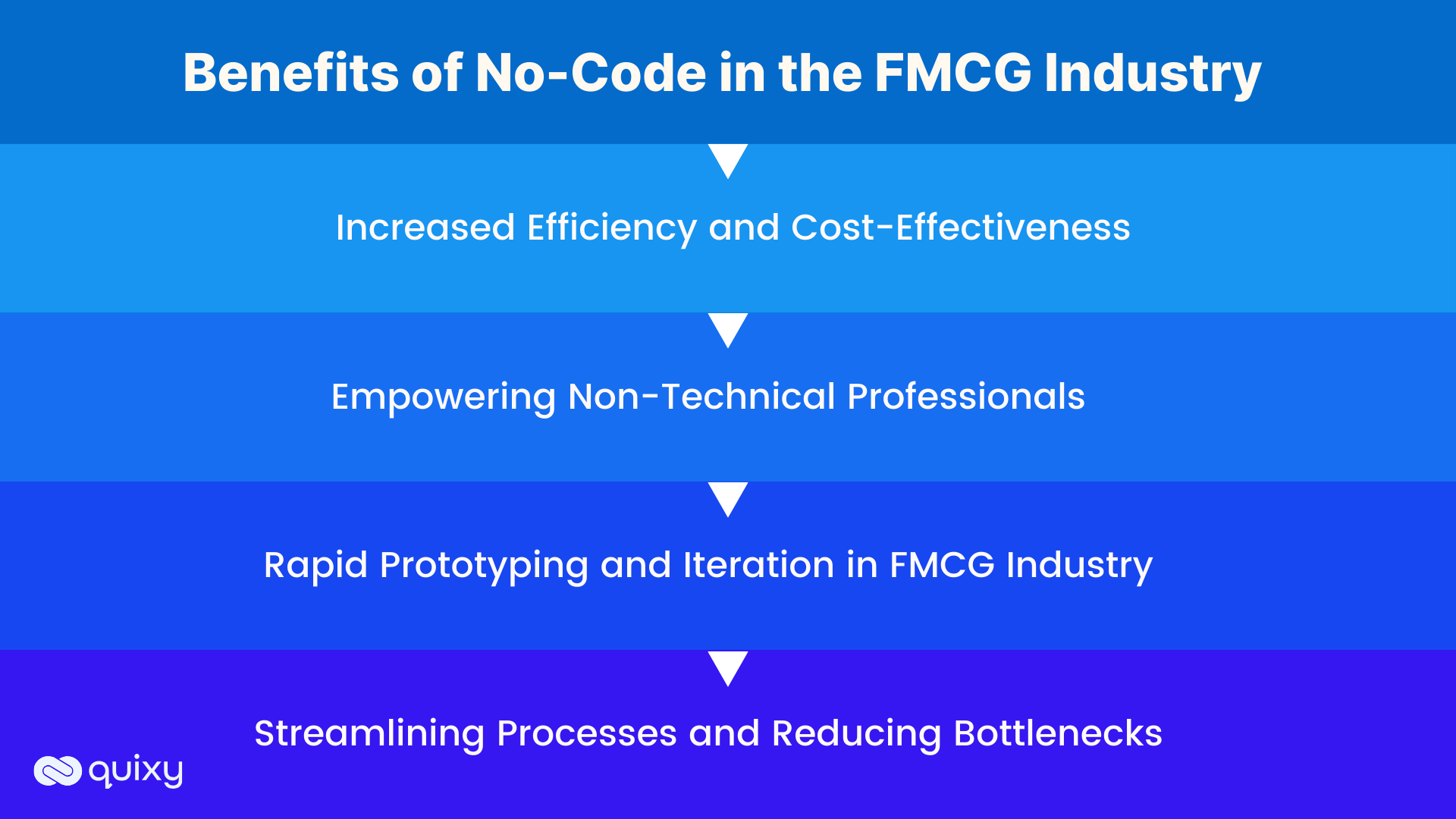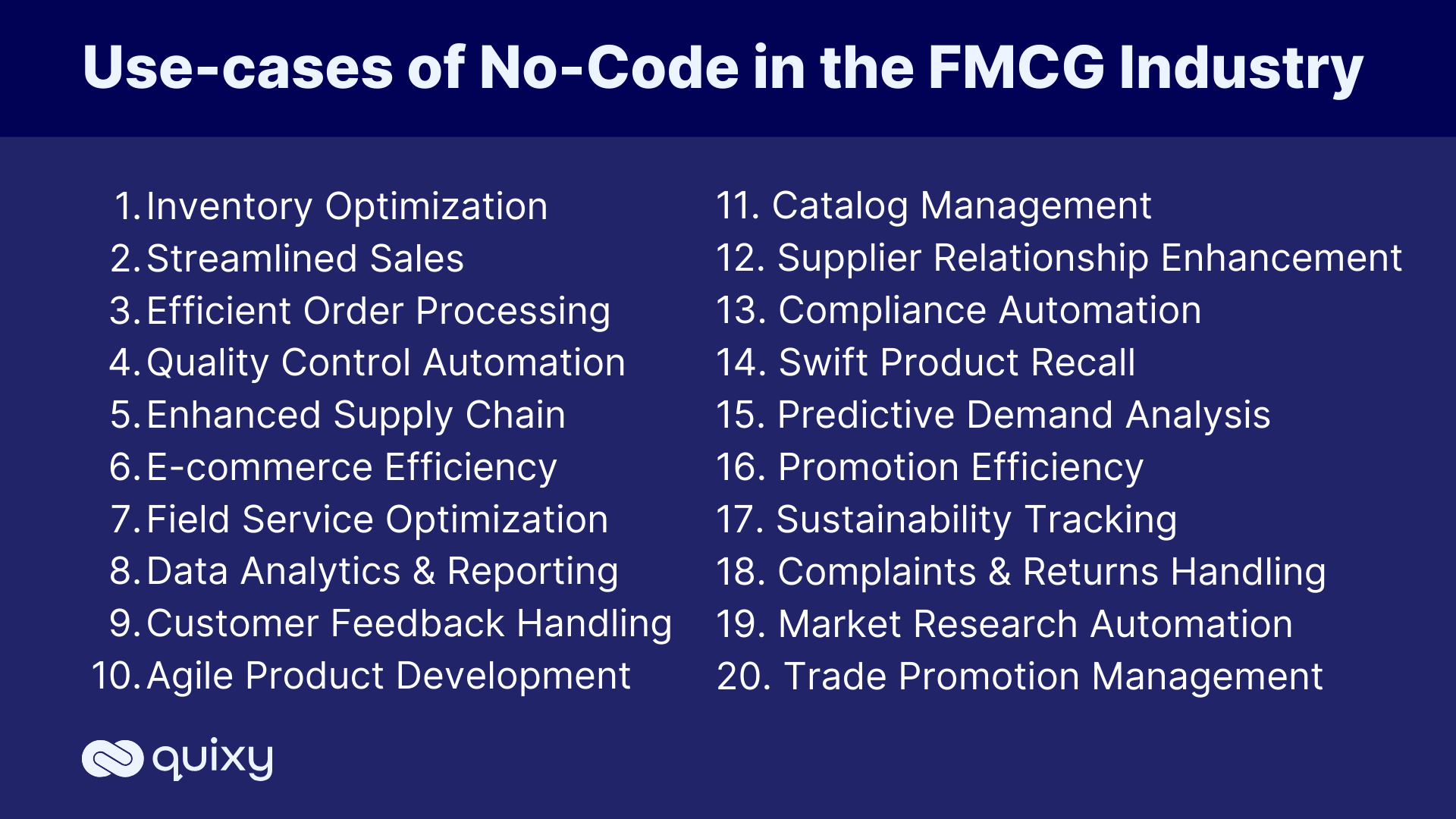
The rapidly evolving landscape of Fast-Moving Consumer Goods (FMCG) demands unparalleled adaptability and responsiveness. In a realm where customer preferences shift in the blink of an eye, businesses must seek innovative solutions to stay ahead. This is where the symbiosis between enterprise agility and customized automation solutions comes into play. In this discourse, we delve into how integrating automation platforms empowers FMCG businesses to navigate evolving norms and excel in delivering remarkable customer experiences through automated workflows. Also, How no-code in the FMCG can be transformative!
What is FMCG?
FMCG stands for “Fast-Moving Consumer Goods.” These everyday consumer products are sold quickly and at relatively low cost. FMCG products include food, beverages, toiletries, cleaning products, and over-the-counter drugs. They are characterized by their short shelf life, high consumer demand, and frequent replenishment.
Fun Fact: The global market for automation in FMCG is projected to reach $70 billion by 2025, promising substantial growth and opportunity. Furthermore, these platforms facilitate not only cost reduction but also a remarkable improvement in customer service, with businesses experiencing an average of 15% savings in operating costs and a 10% increase in customer satisfaction through supply chain automation.
What is the need for Automation in the FMCG Industry?
What if we tell you that the key to thriving in the dynamic FMCG (Fast-Moving Consumer Goods) industry lies in harnessing the power of automation? How could such a transformative force reshape the landscape of an industry known for its rapid pace and intense competition?
Success in the FMCG (Fast-Moving Consumer Goods) industry hinges on adaptability and efficiency. At its core, automation catalyzes remarkable transformation, offering a comprehensive automated solution to the industry’s perpetual challenges. By orchestrating automation across various facets of production, quality control, inventory management, and data analytics, FMCG enterprises can streamline operations, curtail costs, maintain unwavering product quality, and exhibit nimbleness in the face of shifting market landscapes. Embracing automation isn’t merely a choice; it’s the strategic imperative that empowers FMCG businesses to not only meet the demands of today but also forge a sustainable and prosperous future.
Unlocking FMCG Excellence: No-Code Automation Takes the Lead
We know we need to improve efficiency in the industry of Fast-Moving Consumer Goods (FMCG), the ‘same-old’ approach no longer cuts it. Staying competitive isn’t just about efficiency but innovation and adaptability. Enter ‘no-code automation,’ a game-changer that’s turning FMCG operations on their head.
FMCG, known for relentless competition and rapid change, requires a new way of thinking. No-code automation allows anyone, not just tech experts, to create and modify automated workflows. This liberating approach not only accelerates projects but also ignites innovation. New ideas can be tested and deployed swiftly, unburdened by coding complexities.
But it’s not just about innovation. ‘No-code automation’ simplifies essential tasks like data integration and inventory management, supercharging efficiency, slashing errors, and ensuring top-notch product quality.
No-code automation is rewriting the rules of FMCG. It’s streamlining operations, igniting innovation, and enhancing adaptability. As FMCG players navigate the ever-shifting market, this tech is their secret weapon for triumph and sustainability.
Also Read: Everything you should know about No-Code Development
Benefits of No-Code in the FMCG Industry

1. Increased Efficiency and Cost-Effectiveness
No-code automation platforms have revolutionized FMCG Industry with efficient operations. Unlike traditional software development, no-code solutions like Quixy swiftly design and deploy applications without coding expertise, automating processes from inventory management to sales forecasting. This expedites operations, reduces costs, and enables resource allocation for innovation and customer experience enhancement.
2. Empowering Non-Technical Professionals
In FMCG’s fast-paced landscape, no-code platforms democratize automation, empowering non-technical professionals from sales to marketing to drive processes. Intuitive interfaces, templates, and visual workflows allow customized solutions, fostering innovation and efficiency. Reduced reliance on IT accelerates responses to market dynamics and customer needs, securing a competitive industry edge.
3. Rapid Prototyping and Iteration in the FMCG Industry
FMCG’s innovation demands rapid adaptation. No-code platforms excel in quick prototyping and iteration, a market advantage. Unlike lengthy traditional development, no-code enables swift idea testing through user-friendly prototypes, supporting informed, data-driven iteration. This agility positions BenefitsEffbusinesses to seize opportunities promptly and emerge as industry leaders.
4. Streamlining Processes and Reducing Bottlenecks
No-code automation overcomes FMCG challenges of complex workflows and bottlenecks by streamlining processes. Unlike traditional approaches involving IT and vendors, no-code empowers businesses to design and deploy automated workflows swiftly, enhancing efficiency and tailoring processes. Reduced manual intervention, minimized errors, and automated tasks lead to smoother operations, faster order fulfillment, and improved customer service. Real-time process tracking enables data-driven decision-making and continuous improvement.
Use Cases of No-Code in the FMCG Industry
No-code automation platforms have permeated various facets of the FMCG industry, revolutionizing how businesses operate and deliver value to their customers.

Here, we explore a diverse range of use cases that exemplify the transformative impact of no-code solutions in this dynamic landscape:
1. Inventory Management Optimization
FMCG companies can utilize no-code platforms to create custom inventory tracking and management solutions. This includes automating stock replenishment based on demand, minimizing excess inventory, and preventing stockouts through real-time data integration. This can help escape the frustration of inventory inaccuracies and supply chain glitches. Embrace precise stock management and streamlined operations for a future free from inefficiencies.
2. Sales Process Enhancement
No-code solutions empower sales teams to automate lead tracking, customer interaction records, and sales reporting. This translates to efficient pipeline management, personalized sales interactions, and accurate sales forecasts. This will help remove the hassles of manual lead tracking and the frustrations of unreliable reporting inaccuracies. Embrace a streamlined process for accurate insights and efficient operations.
3. Order Processing and Fulfillment
Experience the transformation of order processing and fulfillment through automation platforms. Embrace streamlined order management, automated status updates, and efficient delivery logistics. No more delays or customer dissatisfaction – just timely fulfillment and heightened satisfaction.
4. Quality Control and Auditing
Revolutionize quality control and auditing in the FMCG sector using no-code platforms. Seamlessly digitize quality assurance with automated inspections and audits, guaranteeing product excellence and regulatory adherence. Say goodbye to inconsistent quality checks and laborious audit procedures, ushering in an era of efficiency and precision.
Also Read: How to effectively choose and adopt a No-Code Platform
5. Supply Chain Optimization
No-code solutions integrate and analyze data from various supply chain systems, providing real-time visibility into inventory levels, order statuses, and logistics information. This leads to improved supply chain performance and better decision-making. Embrace this advancement, leaving behind supply chain blind spots and operational inefficiencies for a new era of optimized operations.
6. E-commerce Operations
Experience the benefits of automating order management across diverse e-commerce channels. Witness accelerated order processing and heightened last-mile delivery efficiency, resulting in reduced delivery times and elevated customer satisfaction. Leave behind the frustrations of delivery delays and disjointed e-commerce operations as you step into a seamless and efficient future.
7. Field Service Management
No-code platforms like Quixy can optimize field service operations by automating route planning, service ticket management, and field data collection. This improves response times, service quality, and overall field operations efficiency. With these advancements, bid adieu to the era of manual inefficiencies, welcoming a future where streamlined processes effortlessly eliminate the challenges that have long plagued your field operations.
8. Data Analytics and Reporting
Automation tools facilitate data collection, analysis, and reporting, enabling FMCG businesses to track market trends, customer behavior, and sales performance. Interactive dashboards and reports support data-driven decision-making.
9. Customer Feedback and Support
Leverage the power of automation tools for comprehensive data handling in FMCG businesses. Seamlessly collect, analyze, and report on market trends, customer behaviors, and sales performance. Interactive dashboards and reports empower informed decision-making, revolutionizing your approach to business strategy.
10. New Product Development
Harness the potential of no-code platforms for FMCG firms to swiftly prototype and test novel products. This agility empowers businesses to promptly adapt to market trends, refining product concepts based on real-time feedback and ensuring a competitive edge in an ever-evolving landscape.
11. Product Catalogue Management
No-code solutions simplify the management of product catalogs, ensuring accurate and up-to-date information is accessible to both internal teams and customers, thereby enhancing the sales process. Say goodbye to outdated product information and inconsistent catalogs.
12. Supplier Relationship Management
Automation aids in managing supplier interactions, tracking orders, and monitoring supplier performance, leading to more efficient procurement processes and improved supplier relationships. As the usage of No-code platforms increases, challenges like supplier communication and procurement bottlenecks are eliminated.
13. Regulatory Compliance
No-code platforms revolutionize compliance processes by automating adherence to regulatory standards and maintaining documentation seamlessly. Eliminate the need for manual interventions and welcome a compliance landscape that operates smoothly in the background, allowing your focus to remain on core business activities.
Also Read: 5 ways to achieve Success with No-Code Low-Code
14. Product Recall Management
During product recalls the prowess of no-code automation shines by efficiently overseeing the entire recall process. From pinpointing affected items to communicating with customers, this technology streamlines operations. Say goodbye to the chaos of recalls and welcome a method that handles intricacies seamlessly, safeguarding your brand’s reputation.
15. Predictive Analytics for Demand Forecasting
Harnessing historical data and predictive analytics, no-code platforms enhance demand forecasting precision. This aids businesses in fine-tuning inventory levels and production schedules. Uncertainty in demand planning can be eliminated easily and a data-driven strategy that keeps your operations seamlessly aligned with market needs can be embraced.
16. Promotion Management and Optimization
No-code platforms empower FMCG companies to streamline promotion management. With these tools, businesses can design and automate promotional campaigns, including discounts, loyalty programs, and seasonal offers. Real-time data analysis helps in optimizing promotions by monitoring their effectiveness and adjusting strategies accordingly. This ensures that promotions resonate with customer preferences, leading to increased sales and customer loyalty while minimizing the risk of overstocking or underutilizing resources.
17. Sustainability and Environmental Tracking
FMCG businesses are increasingly focused on sustainability in today’s environmentally conscious world. No-code automation facilitates tracking sustainability metrics and environmental impact throughout the supply chain. Companies can automate the collection of data on energy consumption, waste management, and carbon emissions. This data can be used to implement eco-friendly initiatives, reduce operational costs, and comply with regulatory requirements. No-code solutions make it easier for FMCG companies to meet sustainability goals and communicate their efforts to eco-conscious consumers.
18. Complaints and Returns Management
Handling customer complaints and product returns efficiently is essential for maintaining a positive brand image. No-code platforms can automate the process of receiving, categorizing and resolving customer complaints and returns. Automated workflows can route complaints to the appropriate teams, trigger investigations, and provide real-time updates to customers. This ensures that issues are addressed promptly, improving customer satisfaction and retention. Additionally, data collected through automation can be analyzed to identify recurring problems and drive product or process improvements.
19. Market Research and Consumer Insights
No-code automation can streamline the process of gathering market research and consumer insights. FMCG companies can use these platforms to automate data collection from various sources, such as surveys, social media, and online reviews. Automated analysis tools can identify trends, sentiment, and emerging consumer preferences. This data-driven approach helps businesses make informed decisions regarding product development, marketing strategies, and product positioning. It also enables quicker responses to changing consumer behavior, giving FMCG companies a competitive edge.
20. Trade Promotion Management
For FMCG companies, managing trade promotions with retailers and distributors is a critical aspect of business operations. No-code automation platforms can assist in the planning, execution, and evaluation of trade promotions. These platforms can automate the calculation of promotional costs, track inventory levels, and provide insights into the ROI of various promotions. By automating these processes, FMCG businesses can optimize their trade promotion strategies, reduce administrative overhead, and ensure that promotions align with overall business goals.
Future Trends and Opportunities for No-Code in the FMCG Industry
1. AI-Powered Automation
No-code automation in the FMCG industry is on the brink of an AI-driven revolution. Integrating AI with no-code platforms enhances efficiency and smart decision-making as it advances. AI-powered automation can analyze data, predict trends, and optimize supply chains, allowing FMCG businesses to personalize strategies and offer enhanced customer support through AI-driven chatbots. This fusion of no-code simplicity and AI sophistication promises a future where advanced technologies are accessible without extensive technical expertise.
2. Customization and Personalization
No-code automation is driving a future of FMCG customization and personalization. Rapid application deployment empowers unique customer experiences, from product recommendations to marketing campaigns, while fostering employee innovation. With no-code platforms, FMCG gains a competitive edge in tailored solutions, elevating customer engagement and satisfaction
3. Collaboration and Team-Based Development
The future of FMCG no-code automation is collaborative and team-driven. Evolving platforms enable cross-functional teams to jointly design and implement automation solutions. With intuitive interfaces, non-technical members actively contribute, fostering innovation. Enhanced platforms will support version control, real-time editing, and collaborative testing, accelerating adoption and problem-solving. No-code’s role in democratizing automation development will be pivotal for transformative outcomes as businesses value diverse perspectives.
The future of no-code in FMCG is promising, with AI automation, customization, personalization, and collaboration reshaping operations for customer and internal value. The fusion of no-code simplicity with advanced tech will unlock efficiency, creativity, and competitiveness in this evolving landscape.

Conclusion
In the dynamic FMCG landscape, no-code automation drives innovation, boosting agility, efficiency, and customer-centricity. From inventory management to sales, these platforms yield tangible results. As customer demands evolve swiftly, embracing no-code automation is pivotal, enabling businesses to excel by overcoming challenges, seizing opportunities, and delivering exceptional experiences. From efficiency and personalization to collaboration and AI, the future of FMCG hinges on seamless no-code integration, propelling the industry toward a transformative and customer-centric future.
Frequently Asked Questions (FAQs)
Q. How does No-Code streamline FMCG supply chains?
No-Code simplifies supply chain management in FMCG by enabling rapid app development. This facilitates real-time tracking of inventory, optimized logistics, and efficient distribution. It ensures products reach consumers faster, reduces costs, and minimizes stockouts.
Q. Can No-Code enhance FMCG customer engagement?
Absolutely. No-Code empowers FMCG brands to create interactive mobile apps and personalized marketing campaigns. This boosts customer engagement, loyalty, and overall experience through tailored offers and easy access to product information.
Q. Is No-Code agility key for FMCG market adaptation?
Yes, No-Code’s agility is crucial for FMCG. It allows businesses to respond swiftly to market shifts by rapidly developing new product promotions and adapting supply chains to changing demands.
Q. What about compliance and security in FMCG No-Code?
No-code platforms prioritize compliance and security. They often offer features for data protection and regulatory compliance. FMCG companies should still ensure adherence to industry-specific standards and best practices.
Q. What cost savings can FMCG expect from No-Code?
FMCG companies can realize significant cost savings through reduced development time, minimized manual processes, and increased operational efficiency. No-Code’s quick ROI often outweighs initial implementation costs, making it a financially sound choice.
Subscribe
Login
Please login to comment
0 Comments
Oldest















